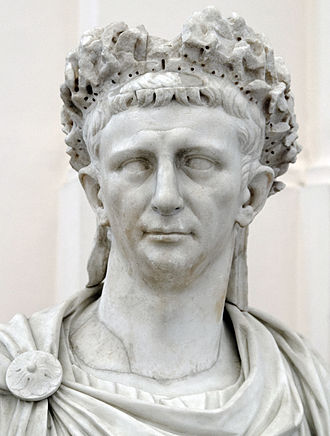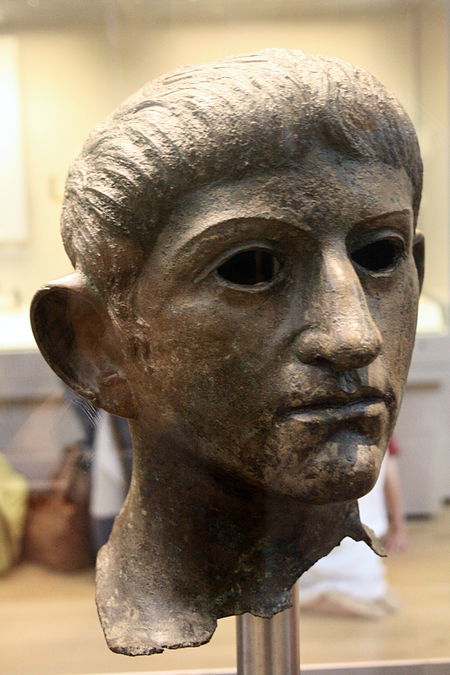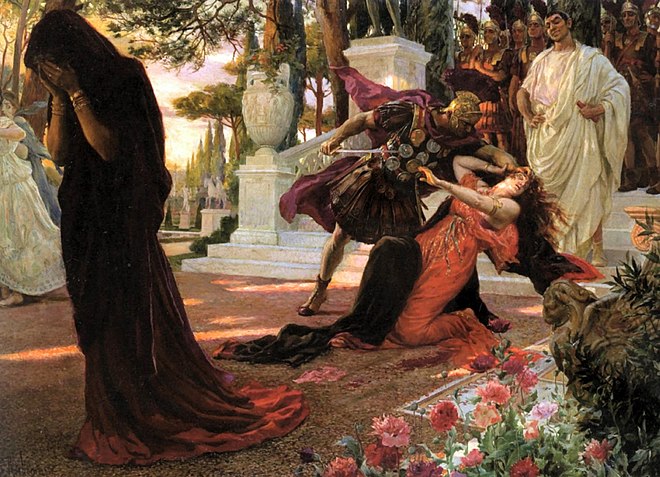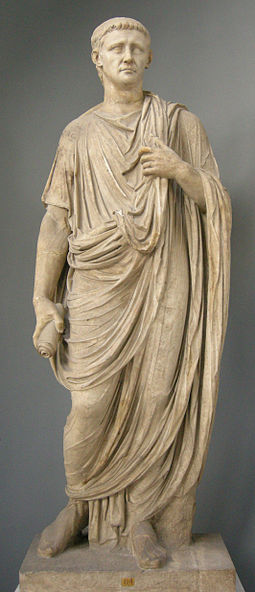*This post contains affiliate links which means that should you decide to make a purchase I may earn a small comission at no additional cost to you*

Early life
Claudius, or Tiberius Claudius Caesar Augustus Germanicus as formally adressed, was born on August 1 10 BC at Lugdunum (modern day Lyon, France) as the second son and youngest child of military commander Nero Claudius Drusus and Antonia Minor. His older siblings included general Germanicus and Livilla.
He was the grandson of Mark Antony and Octavia Minor (Augustus’ sister and Julius Caesar’s grandniece) on his mother’s side and Tiberius Claudius Nero and Livia (Augustus’ third wife) on his father’s side.
In 9 BC, his father unexpectedly died on campaign in Germania. Claudius was left to be raised by his mother, who never remarried. When Claudius’ infirmity became evident, the relationship with his family members turned sour. His mother referred to him as a monster, and used him as a standard for stupidity. It is possible that she passed her son off to his grandmother Livia for several years.
In 7 AD Titus Livius was hired to tutor him in history with the aid of Sulpicus Flavus. Following the wane of his infirmity symptoms in his teenage years his family finally noticed his scholarly interests and the expectations about his future increased.
Becoming Emperor
On 24 January 41 emperor Caligula, his wife Milonia Caesonia and daughter Julia Drusilla were assassinated in a broad-based conspiracy involving the Praetorian commander Cassius Chaerea and several senators. No official evidence of Claudius’ involvement in the assasination is existing.
Following the murders Claudius witnessed German guards killing uninvolved nobles, some of his friends included. He fled to the palace to seek shelter. Tradition implies that he was found by a Praetorian named Gratus and declared emperor. He was then moved to the Praetorian camp for his safety.
The Sanate met soon after and began a debate over the change of government which escalated into an argument about which one would be the new emperor. The Praetorian guards, having chosen Claudius as candidate for the throne, successfully crowned him on January 25.
In order to legitimize his rule against potential usurpers he dropped the cognomen (third name of an ancinet Roman citizen) Nero and adopted the name Caesar, which held great weight with the common people.
As Emperor
Empire Expansion
During Claudius’ reign the Empire show the first major invasion since the reign of Augustus.
In 43 Claudius sent Aulus Plautius with 4 legions in Britannia after an appeal of an ousted tribal ally. Claudius himself traveled to the island after the completion of initial offensives, bringing with him reinforcements and elephants. The Roman colonia of Colonia Claudia Victricensis was established as the provincial capital of the newly established province of Britannia at Camulodunum, where a large temple was dedicated to the emperor’s honor.
He left after 16 days, but remained in the provinces for some time. The Senate granted him a triumph for his efforts, a honor restricted to members of the Imperial family.
In 48 Claudius conducted a census that found 5,984,072 Roman citizens (adult males with Roman citizenship only) with an increase of about a million since the census conducted at Augustus’ death.
Judicial and legislative affairs

Claudius personally judged many of the legal cases tried during his reign.
He extended the summer court session, as well as the winter term, by shortening the traditional breaks. Claudius also made a law requiring plaintiffs to remain in the city while their cases were pending, as defendants had previously been required to do. These measures had the effect of clearing out the docket. The minimum age for jurors was also raised to 25 in order to ensure a more experienced jury pool.
Claudius also settled disputes in the provinces. He freed the island of Rhodes from Roman rule for their good faith and exempted Troy from taxes. Early in his reign, the Greeks and Jews of Alexandria sent him two embassies at once after riots broke out between the two communities. This resulted in the famous “Letter to the Alexandrians“, which reaffirmed Jewish rights in the city but also forbade them to move in more families en masse. The rights and freedoms of all the Jews in the Empire were also reaffirmed in the later years, according to Josephus.
Claudius punished false assumption of citizenship harshly, making it a capital offense. The only exeption is the granting of citizenship to old Roman people from the city of Tridentum. In similar manner, any freedmen found to be laying false claim to membership of the Roman equestrian order were sold back into slavery.
Numerous edicts were issued throughout Claudius’ reign on a number of topics, from medical advice (the promotion of yew juice as a cure for snakebite) to moral judgments (the status of sick slaves).
Public work
Claudius did many public works throughout his reign, both in the capital and in the provinces. He built two aqueducts: the Aqua Claudia, which begun by Caligula, and the Anio Novus. These entered the city in 52 and met at the Porta Maggiore. He also restored a third (Aqua Virgo).
He built roads and canals throughout Italy and the provinces. Among these was a large canal leading from the Rhine to the sea, as well as a road from Italy to Germany – both of which begun by his father, Drusus. Closer to Rome he built a navigable canal on the Tiber, leading to Portus, his new port just north of Ostia.
The port at Ostia was part of Claudius’ solution to the constant grain shortages that occurred in winter, after the Roman shipping season. The other part of his solution was to insure the ships of grain merchants who were willing to risk travelling to Egypt in the off-season.
The last part of Claudius’ plan was to increase the amount of arable land in Italy. This was to be achieved by draining the Fucine lake, which would have the added benefit of making the nearby river navigable year-round. A tunnel was dug through the lake bed, but the plan was a failure. The tunnel was crooked and not large enough to carry the water, which caused it to back up when opened. The resultant flood washed out a large gladiatorial exhibition held to commemorate the opening, causing Claudius to run for his life along with the other spectators. The draining of the lake continued to present a problem well into the Middle Ages.
Coup attempts
Several coup attempts were made during Claudius’ reign, resulting in the deaths of many senators. Appius Silanus was executed early in Claudius’ reign under questionable circumstances. Shortly after, a large rebellion was undertaken by the Senator Vinicianus and Scribonianus (governor of Dalmatia) which gained quite a few senatorial supporters. It ultimately failed due to the reluctance of Scribonianus’ troops, which led the main conspirators to suicide.
Many other senators tried different conspiracies and were condemned, like Claudius’ son-in-law Pompeius Magnus who was executed for his part in a conspiracy with his father Crassus Frugi.
In 46, Asinius Gallus (grandson of Asinius Pollio) and Titus Statilius Taurus Corvinus were exiled for a plot hatched with several of Claudius’ own freedmen. Valerius Asiaticus was executed without public trial for unknown reasons (Claudius singles him out for special damnation in his speech on the Gauls indicating a serious charge).
Relationship with the Senate
Claudius was eager to please the Senate. He refused to accept all his predecessors’ titles (including Imperator) at the beginning of his reign, preferring to earn them in due course. He allowed the Senate to issue its own bronze coinage for the first time since Augustus’ reign. He also put the Imperial provinces of Macedonia and Archaea back under Senate control.
Claudius set about remodeling the Senate into a more efficient, representative body. He chided the senators about their reluctance to debate bills introduced by himself, as noted in the surviving speech below.
If you accept these proposals, Conscript Fathers, say so at once and simply, in accordance with your convictions. If you do not accept them, find alternatives, but do so here and now; or if you wish to take time for consideration, take it, provided you do not forget that you must be ready to pronounce your opinion whenever you may be summoned to meet. It ill befits the dignity of the Senate that the consul designate should repeat the phrases of the consuls word for word as his opinion, and that every one else should merely say ‘I approve’, and that then, after leaving, the assembly should announce ‘We debated’
In 47 he assumed the office of censor with Lucius Vitellius. He struck the names of many senators and equites who no longer met qualifications, but showed respect by allowing them to resign in advance. At the same time, he sought to admit eligible men from the provinces. The Lyon Tablet preserves his speech on the admittance of Gallic senators, in which he addresses the Senate with reverence but also with criticism for their disdain of these men. He even jokes about how the Senate had admitted members from beyond Gallia Narbonensis (Lyons, France), i.e. himself. He also increased the number of Patricians by adding new families to the dwindling number of noble lines.
Nevertheless, many in the Senate remained hostile to Claudius, and many plots were made on his life. As a result, Claudius reduced the Senate’s power for the sake of efficiency.
Centralization of powers
Claudius was the first emperor to increase the role of freedmen (formely enslaved people) as the powers of the princeps became more centralized and the burden larger. This practice was based on his belief that free born magistrates shouldn’t have to work under him.
The secretariat was divided into bureaus, with each being placed under the leadership of one freedman. Narcissus was the secretary of correspondence, Pallas became the secretary of the treasury and Callistus the secretary of justice. There was also a fourth bureau for miscellaneous issues, which was put under Polybius, until his execution for treason. The freedmen could also officially speak on behalf of the Emperor, as when Narcissus addressed the troops in Claudius’ stead before the conquest of Britain.
The senators were sceptical about such power being placed in the hands of former slaves, as they feared the Emperor could get manipulated by them.
Claudius was similarly appreciative of the freedmen under his service and gave them due credit for policies where he had used their advice. However, if they showed treasonous inclinations, he did punish them with just force, as with the case of Polybius and Pallas’ brother, Felix.
Religious reforms

Claudius had a strong vision about the proper form of state religion.
He refused the request of Alexandrian Greeks to dedicate a temple to his divinity, saying that only gods may choose new gods. He restored lost days to festivals and got rid of many extraneous celebrations added by Caligula. He also re-instituted old observances and archaic language.
Claudius was concerned with the spread of eastern mysteries within the city and searched for more Roman replacements. He emphasized the Eleusinian mysteries which had been practiced by so many during the Republic. He went as far as to expell foreign astrologers, and rehabilitate the old Roman soothsayers (known as haruspices) as a replacement at the same time.
Public Games and Entertainment
Historian Suetonius remarks that Claudius was very fond of games. He was said to praise the fighters at the end of gladiatorial matches. After he became emperor he ordered games to be held in honor of his father on his father’s birthday as well as annual games in honour of his accession that took place at the Praetorian camp (where Claudius had first been proclaimed Emperor).
The Secular Games were another perfomance organised by Claudius this time for celebrating the 800th anniversary of the founding of Rome.
Claudius organised many public games and shows as well as rebuilting Pompeii’s Theatre, which was destroyed by fire.
Marriages
Claudius had a total of four marriages amd two failed betrothals (the first to Aemilia Lepida, broken off for political reasons and the second to Livia Medullina Camilla, who died suddenly on their wedding day)
Plautia Urgulanilla
She was the granddaughter of Livia’s confidant, Urgulania. During their marriage she bore a son, Claudius Drusus, who died of asphyxiation in his early teens. Claudius divorced her after accusations of adultery and suspicion of being the murderer of her sister-in-law Apronia. Plautia gave birth to a baby girl, Claudia, after the divorce but the child was repudiated by Claudius.
Aelia Paetina
In 28 Claudius married Aelia Paetina, relative of Sejanus. Aelia gave birth to a daughter, Claudia Antonia during their marriage. Claudius divorced her when the marriage became a political liability.
Valeria Messalina
In 38 or 39 Claudius married his first cousin once removed Valeria Messalina, who had close connections with Caligula’s circle. Early in their marriage she gave birth to a daughter, Claudia Octavia.

After Claudius accession to the throne she bore a son, Tiberius Claudius Germanicus, later known as Britannicus.
The marriage ended tragically. It is believed that Messalina was a nymphomaniac and regularly cheated oh her husband.
In 48 Messalina married her lover Gaius Silius while Claudius was away at Ostia. Under the Roman law before a new marriage would take place the spouce needed to be aware that he or she had been divorced. In Claudius’ case he was in total ignorance until after the marriage.
This led Claudius to execute Silius, Messalina and most of Messalina’s circle.

Agrippina the Younger
Claudius’ last marriage was with his niece, Agrippina the Younger.
The attempted coup d’état by Silius and Messalina made Claudius realize the weakness of his position as a member of the Claudian but not the Julian family. This weakness was compounded by the fact that he did not yet have an obvious adult heir (Britannicus was just a boy). Agrippina was one of the few remaining descendants of Augustus, and her son Lucius Domitius Ahenobarbus (the future Emperor Nero) was one of the last males of the Imperial family.
It is possible that the Senate arranged the marriage to end the feud between the Julian and Claudian branches.
Claudius accepted Agrippina as a wife and also adopted the newly mature Nero as his son. Nero was already married to Claudius’ daughter Octavia and was made joint heir with underage Britannicus.

Infirmity & Personality
According to historian Suetonius’ description, Claudius had weak knees that gave way under him and his head shook. He stammered and his speech was confused, he slobbered and his nose ran when he was excited, but had no physical deformity nontheless.
Historians portray him as generous and lowbrow. Other attributes include bloodthirst, cryelty, fondness of gladiatorial combat and executions, quick anger (a trait acknowledged by Claudius himself), naivety and a very easy manipulated character.
However his works show an intelligent, scholarly, well-read, and conscientious administrator with a keen eye to detail and justice. Thus, Claudius’ true persona remains an enigma.
Scholarly works
Claudius was a copious writer during his lifetime. The norm for young historians of his time was to either write about the new empire or obscure antiquarian subjects. Claudius was a rare case, as he covered both topics.
Among his works are:
- The History of Augustus’ reign
- Tyrrhenica, a twenty-book Etruscanhistory
- Carchedonica, an eight-volume history of Carthage
- An Etruscan dictionary
- De arte aleae, a book on dice-playing
- A Defence of Cicero against Asinius Gallus’ charges
- An eight-volume autobiography

Claudius also proposed a reform of the Latin alphabet by the addition of three new letters, two of which served the function of the modern letters W and Y; the third was equivalent to Greek Ψ. He officially instituted the change during his censorship but they did not survive his reign.
Unfortunatelly none of his works survive but live on as sources for the surviving histories of the Julio-Claudian dynasty.
Death

Claudius died in the early hours of 13 October 54 due to poisoning (as many historians claim). The instgator of his death remains unknown even though his wife Agrippina is the most popular suspect. Claudius had a funeral similar to emperor Augustus’ and his ashes were interred in the Mausoleum of Augustus on 24 October 54.
More references on Emperor Claudius can be found in Pliny the Elder’s Natural History


